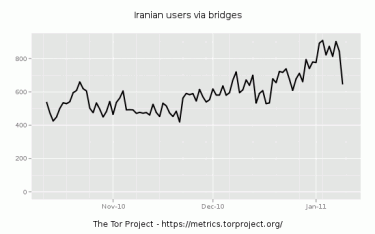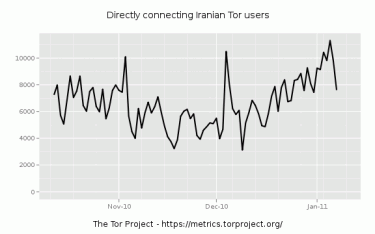The Tor Project reports that the Iranian firewall is now blocking or throttling Tor, a number of other circumvention tools as well as SSL. They recommend using bridges that are not on port 443. Below are several graphs from the Tor Project demonstrating this:
Within Iran there are further conflicting reports indicating that users in different geographic areas are experiencing different levels of throttling and/or blockage. Some users are reporting a complete inability to access Tor, some have difficulty with Skype/VPNs, and yet others are reporting no problem.
Given Iran's recent rhetoric against Green Movement leaders as well as its planned 10 day assault against the Green Movement what Tor and others may be seeing is the digital realization of these political statements and actions within the country. In the past, changes to Iran's filters have been tested on certain ISPs within the country before being implemented nationwide. If the regime is moving towards digitizing its most recent statements and actions, what the Tor Project is seeing now could be localized testing of a planned national rollout.
Supporting this idea were recent comments by Iran’s Intelligence Minister Hojjat-ol-Eslam Heydar Moslehi. He announced that the Intelligence Ministry had intercepted encrypted emails from activists and began fully decrypting them within 24 hours. At a separate conference security chief Esma’il Ahmadi-Moqaddam reasserted the fact that opposition activists should know that all their correspondence is being monitored.
Recent political statements by the Islamic Republic, the possibility of recent subsidy cuts being a tool of political persecution, and information from the Tor project and other activists seem to indicate a renewed effort to squash internal dissent as well as provide a distraction from Iran's economic and political issues. Outside analysts are aware of the ebbs and flows of political rhetoric and brutal intimidation inside Iran. In this case there appears to be heavy political rhetoric simultaneously combining with very targeted (and seemingly localized) changes in Iran's Internet censorship practices which may be warning signs of more significant intimidation and surveillance activities in the near future.






5 comments
>>”Supporting this idea were recent comments by Iran’s Intelligence Minister Hojjat-ol-Eslam Heydar Moslehi. He announced that the Intelligence Ministry had intercepted encrypted emails from activists and began fully decrypting them within 24 hours.”<<
If the encrypted emails are of the GPG type, the above statement is the ultimate in bullshit. They're attempting to instill self-censorship.
Bubba, by now you should know that anything is possible in the Islamic Republic! ;-)